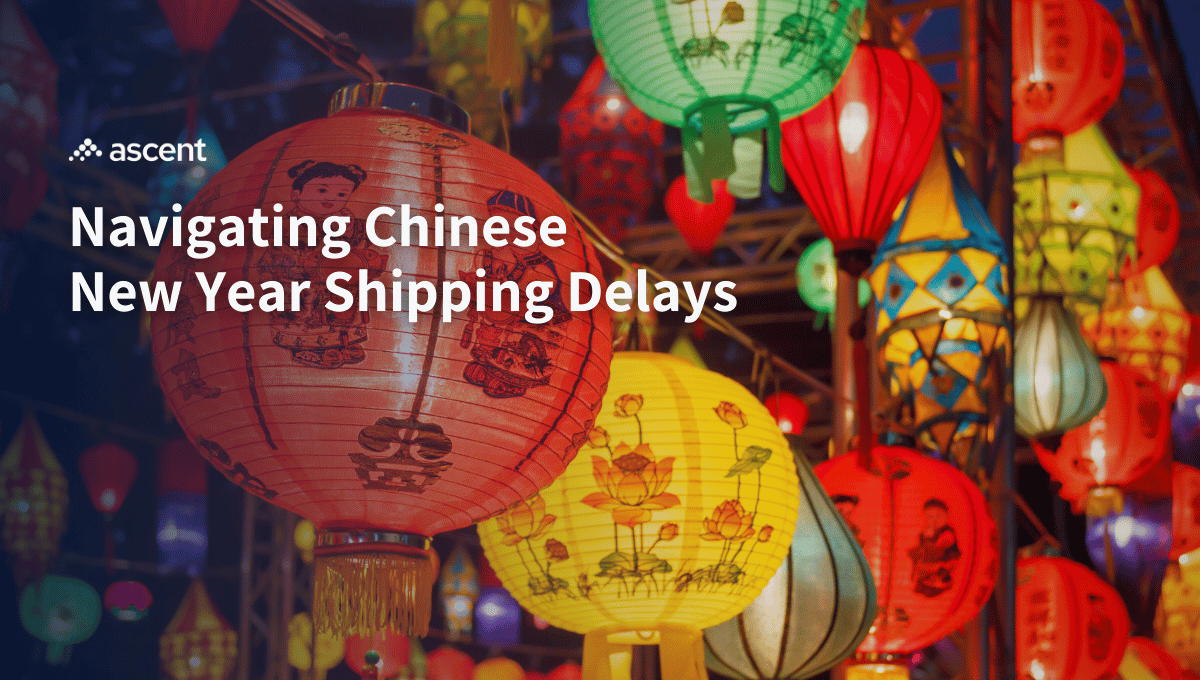Navigating Chinese New Year Shipping Delays
12/09/2024

Chinese New Year (CNY), also known as the Lunar New Year or Spring Festival, is one of the most significant holidays in China, with profound effects on global supply chains. Importers need to be aware of the “Chinese New Year effect” on international shipping. This holiday not only holds cultural importance but also leads to notable shipping delays due to the widespread closure of factories and businesses in China. Understanding the implications of this period and preparing accordingly can help mitigate the impact on your logistics operations.
When is the Chinese New Year 2025?
The Chinese New Year in 2025, the Year of the Snake, will begin on the evening of January 28 (New Year’s
Eve) and end on the Lantern Festival, February 12. This period, spanning approximately 15 days, sees the
first seven days celebrated as public holidays. During this time, a slowdown in business operations is
common, as many Chinese factories and businesses close well in advance, significantly impacting the
global supply chain.
What causes the shipping delays?
This holiday season is a time when many in China and other Asian countries engage in family reunions, leading to a major slowdown in production as factories and offices close to celebrate the new year. Carriers often adjust their service strings to accommodate the decreased output.
Further complicating the situation are recent changes in tariffs, which have led to a shift in sourcing to other countries like Vietnam. These modifications are having a significant impact on the capacity of vessels and sometimes result in rolled bookings.
2025 Chinese New Year Logistics Timeline for Importers and Exporters
As businesses begin slowing down or stopping production for the holiday, importers and exporters should use this timeline to plan their activities. It’s crucial to book shipments well in advance, anticipate delays and have contingency plans in place.
- – Early January 2025 – Preparation phase begins: Businesses start to prepare for the upcoming shutdown. This is the time to finalize and confirm orders before the holiday rush.
- – Mid-January 2025 (1-2 weeks before CNY) – Partial shutdowns begin: Some factories begin to reduce operations. Ports operate but may start experiencing slowdowns due to increased traffic and reduced workforce. Expect increased demand and limited capacity.
- – January 28, 2025 (Chinese New Year’s Eve) – Widespread shutdowns: The majority of factories and businesses close. Ports and transportation services are still operational but at reduced capacity.
- – January 29 – February 4, 2025 (CNY week) – Peak of CNY celebrations: Almost all factories and many businesses are closed. Ports operate with minimal staff; expect significant delays.
- – February 5-11, 2025 – Extended holiday period: Some businesses start to reopen, but many workers are still traveling back. Port operations remain slow.
- – Mid-February 2025 (Post-CNY) – Gradual resumption of work: More factories and businesses begin reopening as employees return to work. Ports start to clear backlogs but still operate below full capacity.
- – Late February 2025 – Return to full operations: Most factories and businesses are back to full operation. Ports work to clear any remaining backlogs and return to normal efficiency levels.
- – Early March 2025 onwards – Stabilization period: Operations across businesses and ports have stabilized. Regular shipping schedules resume.
How To Avoid Shipping Delays
Booking shipments before the Chinese New Year is crucial due to the significant slowdown in manufacturing and shipping activities during this period. Typically, it’s advisable to book your shipments at least 3-4 weeks in advance. However, this can vary depending on several factors:
- – Manufacturing Time: If your goods are still in the manufacturing stage, you need to account for the time it will take to complete production. Many factories in China start winding down operations one to two weeks before the Chinese New Year.
- – Demand and Capacity: The weeks leading up to the Chinese New Year often see a surge in shipping demand. This can lead to limited availability and higher prices. Booking early helps avoid these issues.
- – Type of Shipment: The mode of transport (air, sea, rail, etc.) can affect how early you need to book. Air freight generally requires less lead time than sea freight.
- – Destination and Transit Time: Consider the transit time to your destination. Longer transit times might require earlier booking.
- – Customs and Documentation: Allow time for customs clearance and documentation, as these processes can be slower during the holiday period.
- – Buffer for Delays: It’s wise to include a buffer for unexpected delays, especially during this busy period.
Given these considerations, a general recommendation is to start planning your shipment at least 4-6 weeks before the Chinese New Year. However, it’s best to consult with your freight forwarder or shipping company for specific advice based on your circumstances.
Optimize your logistics with Ascent this Chinese New Year
Planning and navigating shipments around the Chinese New Year can be challenging, but with the proper
preparation and logistics partner, you can minimize disruptions. At Ascent, we specialize in guiding businesses through the complexities of international shipping. Our expertise ensures your shipments are handled efficiently and arrive on time, even during peak periods. Whether you need air, ocean or ground transportation, our international freight forwarding solutions will provide you with peace of mind this holiday season.
January 27, 2025
Thank you for contacting Ascent!
A member of our team will be in contact within a few business hours.
Okay